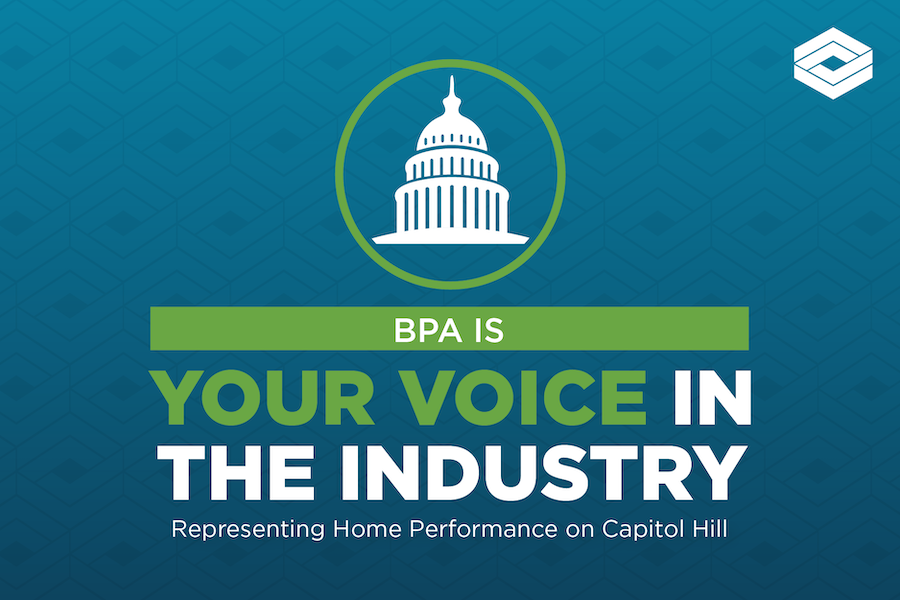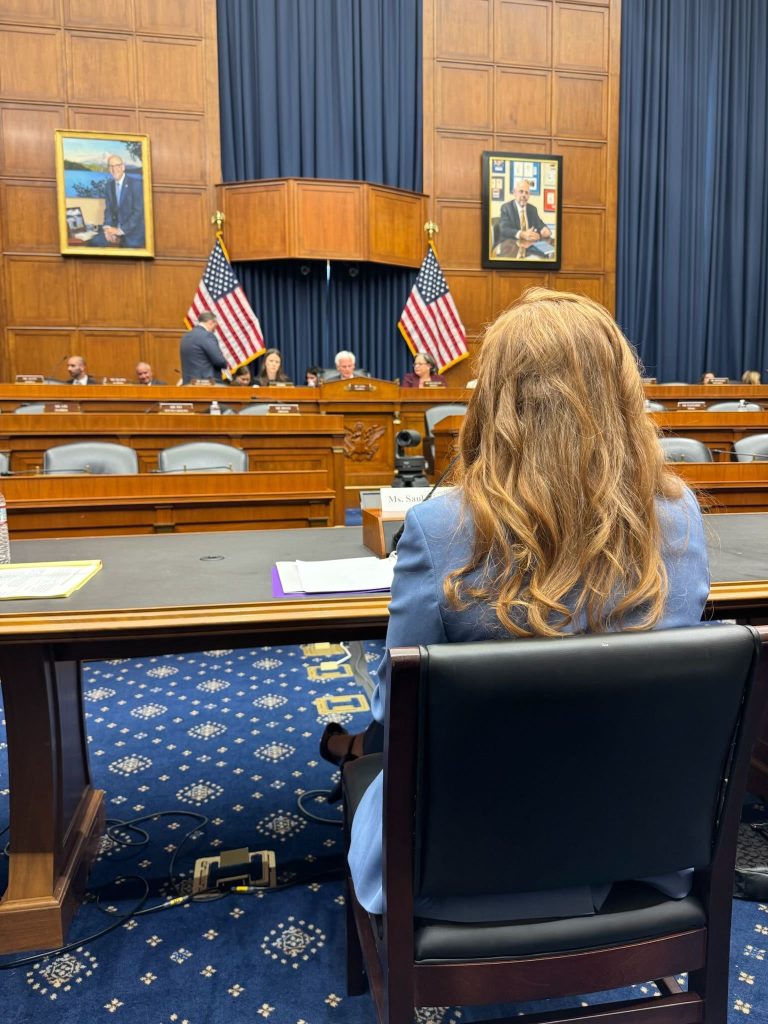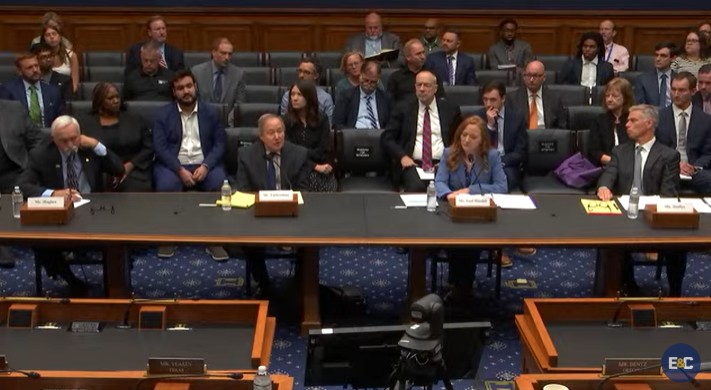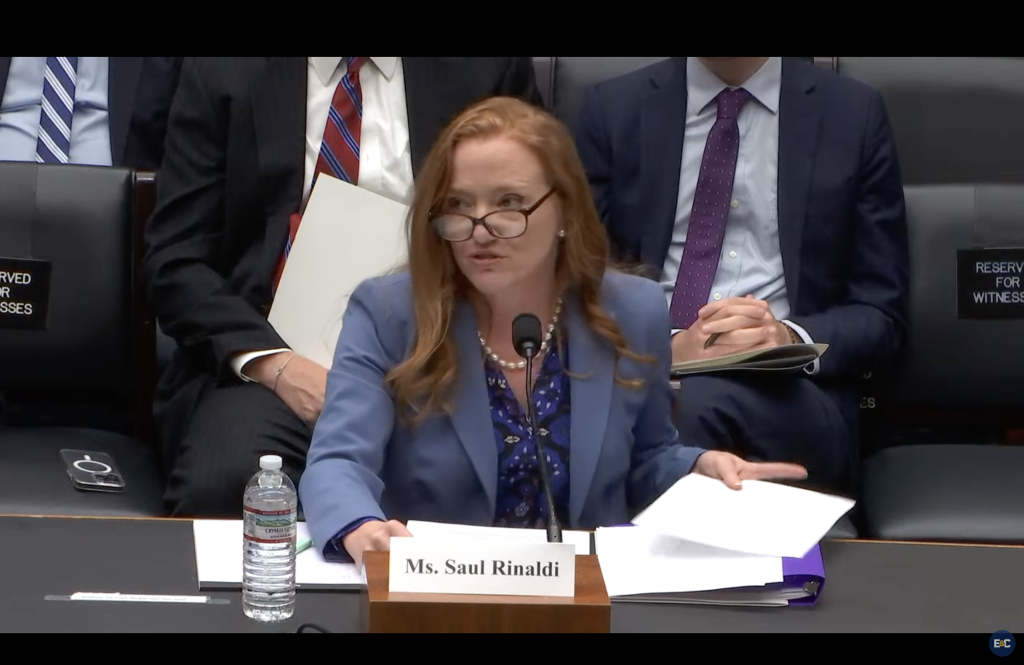
BPA’s Chief Policy Officer Testifies Before Congress on Benefits of Energy Efficiency
September 8, 2025

On Tuesday, September 9, 2025, BPA’s Chief Policy Officer, Kara Saul Rinaldi, testified before Congress at a hearing titled “Building the American Dream: Examining Affordability, Choice, and Security in Appliance and Buildings Policies.”
The purpose of the hearing was to discuss the impact of appliance and building regulations on affordability, consumer choice, and grid reliability.
BPA’s testimony boiled down to this: Energy efficiency supports jobs, energy abundance, energy affordability, and consumer choice. As an advocate and voice for the home performance industry, this testimony gave BPA the opportunity to make sure we remain part of the national conversation surrounding these topics.
Key points from Kara’s testimony included:
- The energy efficiency sector employs nearly 2.4 million Americans—more than the fuels and electric generation industry combined.
- Energy efficiency is essential to keep up with rising power demands from data centers, AI, and onshoring of manufacturing, and helps our economy grow faster.
- Energy efficiency is, by its nature, fuel neutral—no matter the fuel, you can do more with less. It supports consumer choice by allowing families to select the most efficient options based on energy prices and weather conditions.
- Building codes and standards keep homes safe, comfortable, and affordable. They also save lives.
- Reauthorizing the Weatherization Assistance Program (WAP) protects our most vulnerable populations while supporting 8,500 good-paying local jobs that can’t be outsourced.
Witnesses joining Kara in front of the Committee on Energy and Commerce included Buddy Hughes, Chairman, National Association of Home Builders; Ben Lieberman, Senior Fellow, Competitive Enterprise Institute; and Jim Steffes, Senior Vice President of Regulatory Affairs, Washington Gas.

In her opening remarks, Kara reiterated her pride in representing the industry’s contractors, saying, “Advancing energy efficiency in buildings across the U.S. reduces demands on our energy system, while driving local job growth among the small business contractors that I am proud to represent here today.”
The 3-hour hearing covered many key discussion points, but Kara’s responses to various committee members’ questions can be broken into the following areas: jobs, grid reliability, workforce training, and affordability and efficiency standards. Highlights of these conversations are described below.
Jobs
When asked about the impact of eliminating the energy tax credits, such as 25C, in the Trump Administration’s “One Big Beautiful Bill Act,” Kara said the true impact is hard to measure right now since the credits are still available through the end of 2025. She did say, however, that “we know the tax credits led to an increase in jobs so as we take those opportunities away from homeowners, there will be an impact.”
The topic of job creation was present throughout the hearing and included keeping jobs within local communities and the importance of the Weatherization Assistance Program (WAP).
Regarding the former, Kara said, “Energy efficiency has historically been a bipartisan issue. Your local contractor is not going to be found overseas, nor is their job going to be shipped overseas. Local contractors are part of our neighborhoods, they’re part of our communities, and when they grow their small businesses, they grow from their communities.”
When asked if local small businesses can work with federal agencies, Kara responded with a definitive yes. She added, “The local communities working with federal agencies is one of the key ways we can expand. That’s a big part of job creation with local communities.”
Regarding the Weatherization Assistance Program (WAP), Kara’s message was clear: “Weatherization is a job creator. Our contractors are very supportive of the Weatherization [Assistance] Program because of that real connection they have with their customers and the training it provides them.”
Grid Reliability
Another topic of conversation was the impact of new data centers and advanced manufacturing facilities on America’s electric grid. Kara explained that in order to meet the upcoming demand, we will need to deploy energy efficiency upgrades and flexible demand resources at an even faster pace than in the past.
Put simply, she said, “The load growth is going to need to be addressed by energy efficiency. We have to remember that utilities build power plants to meet their peak needs, [but we can] reduce energy use during those peak times. Building codes and appliance standards will bring additional demand off the grid and further help meet the needs of the load growth.”

Workforce Training
In the home performance industry, we know how critical workforce training is to the successful outcome of the work being done in homes across America. Kara reiterated that training is essential to energy efficiency upgrades to make sure that HVAC equipment is properly sized and correctly installed (as an example). She explained that this training is not just an energy efficiency issue, it is also a health and safety issue.
In the hearing, she also answered a question on how the industry values veterans as part of the workforce. “Workforce training is critical right now. Contractors are always looking for trained workers and veterans are where they seek to find new workers for their team.”
Additionally, Kara reiterated that training is important no matter what fuel is used in a home: “We need them to have on-the-job training as well as apprenticeship programs. We need them to be investing in apprenticeship programs and workforce training so that these contractors can go into the homes and be able to understand how to size appropriately the furnaces, how much insulation is needed, and how to make sure to make the most cost-effective upgrade for that home. Whether that home is fueled by gas or whether it’s electric, contractors need to be trained to be sure they’re making the best decisions for the homeowners.”
Affordability and Efficiency Standards
Appliance and efficiency standards, along with building codes, were discussed at length–primarily with the focus on how they affect homeowners, and support or hinder people reaching the goal of homeownership.
“Without efficiency standards, homeowners would buy whatever is cheapest to put in their house. That would likely not include the higher efficiency technologies and they would be spending more on their utility bills,” said Kara.
She continued by outlining the most common American homeowner experience: “I think one of the key things is that most of the time, when we buy a new appliance, it’s because something broke. What ends up happening is they don’t necessarily have thousands of dollars or even hundreds of dollars burning a hole in their bank account. That homeowner needs to figure out how they are going to serve the needs of their family in the most cost-effective way possible–and they will often buy what is at standard. So, what building standards do, and what appliance standards do, is provide that baseline standard so we make sure to protect homeowners from the least-efficient appliances and the least-efficient codes, so that’s why they are really critical.”
As standards help with efficiency, they inherently promote affordability.
“Not every single appliance has a new standard. It has to be cost effective and technologically feasible,” said Kara. She explained that the Department of Energy (DOE) works in conjunction with many manufacturers and other stakeholders to make sure to come up with something that will work for the marketplace.
These savings also apply to renters. “Once these purchases are made by the landlord, those energy savings are recouped by the renter,” Kara said.
Building codes and standards play an important role in ensuring that Americans live and work in safe, comfortable, and affordable homes. In the hearing, Kara reiterated this point: “Appliance standards and building standards are just setting a baseline to make sure that we are protecting our homeowners and our renters from appliances that are really wasteful.”
